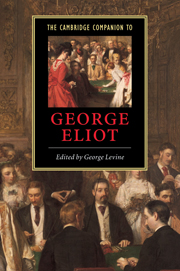Book contents
- Frontmatter
- 1 Introduction
- 2 A woman of many names
- 3 The early novels
- 4 The later novels
- 5 George Eliot and philosophy
- 6 George Eliot and science
- 7 George Eliot and religion
- 8 George Eliot and politics
- 9 George Eliot and gender
- 10 George Eliot and her publishers
- 11 George Eliot
- 12 Works cited and further reading
- Index
4 - The later novels
Published online by Cambridge University Press: 28 May 2006
- Frontmatter
- 1 Introduction
- 2 A woman of many names
- 3 The early novels
- 4 The later novels
- 5 George Eliot and philosophy
- 6 George Eliot and science
- 7 George Eliot and religion
- 8 George Eliot and politics
- 9 George Eliot and gender
- 10 George Eliot and her publishers
- 11 George Eliot
- 12 Works cited and further reading
- Index
Summary
For twenty years from 1856 to 1876 George Eliot was actively engaged in writing novels. The last two, Middlemarch and Daniel Deronda, are generally acclaimed today as her greatest - they are certainly her longest. But is there a clear dividing line between the early and late work?
Rosemarie Bodenheimer has shown how habits of mind formed well before Mary Anne Evans became George Eliot persisted in her writings to the end; and David Carroll has argued persuasively that from start to last the novels were driven by practices of interpretation to which the young Marian Evans was exposed very early. Telling changes in her life predated altogether her career as a novelist: her loss of formal religious belief, the death of her father, her move to London and work for the Westminster Review, the elopement with George Henry Lewes and return to live openly with him in England, even the turn to writing fiction itself. Characteristically she made her most daring decisions without consulting anyone - not because she was secretive by nature but because she was determined to have her way. Secrecy in fact made things worse when it came to explaining to family and friends who had not been consulted. But the fait accompli became means to her ends. After Lewes died and less than a year before her own death, she consulted no one about marrying Johnnie Cross.
- Type
- Chapter
- Information
- The Cambridge Companion to George Eliot , pp. 57 - 75Publisher: Cambridge University PressPrint publication year: 2001
- 2
- Cited by



